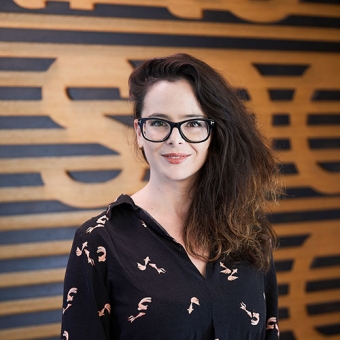Celebrating UNSW’s outstanding educators, the UNSW Vice-Chancellor’s Awards for Teaching Excellence recognise those who have enriched student experiences, improved learning outcomes through innovation and contributed to quality teaching at the University.
Over the years, academics have been recognised for their outstanding practice, impact and leadership of learning and teaching. Education Focussed Academic, Dr Naama Carlin from the School of Social Sciences is one of them. Dr Carlin is the recipient of the 2019 UNSW Awards for Teaching Excellence – Rising Star in Early Career Category.
We sat down with her to know more about her experience in winning the award and why she encourages academics to apply for the 2020 Awards for Teaching.
What does it mean to you to win the award?
I received the award when I was still teaching as a casual academic. So, for me it meant that there was institutional recognition of the impact of my educational efforts and teaching innovation.
But even beyond that – on a personal level – it was quite a reaffirming process. Applying for the award required me to reflect on my own work as an educator and discover what could be the unique components of my teaching practice. I had a network of my colleagues that supported my application which helped bring home the impact we have as educators in the teaching community. Going through a process of guided reflection to deconstruct my teaching approach was a transforming experience.
Shortly before the Vice-Chancellor’s Award, I had won the Faculty of Arts and Social Sciences Teaching Excellence - Rising Star award, which my students (supported and facilitated by the tutor who worked with me) wrote a supporting letter for. This recognition from students was so meaningful, as it validated the impact teachers have on our students' learning. Academics can get overworked with teaching, and so it was wonderful to know that the work you do matters and really reaches students.
These awards added to the body of evidence that I could use to apply for promotions and allowed me to advocate for myself. I am now more confident in my ability to write about my own teaching practice and more self-assured in the process of making a claim and providing appropriate evidence to support the claim.
Could you tell us more about your experience in applying for the teaching award?
Teachers, particularly those working in packed academic terms, have limited frames of reference within which to judge their own worth. Amidst deadlines, assessments and marking, we rarely get the time to take a step back, pause and think about our teaching philosophy. We don’t always think about what we do as academics – so the process of applying for the award was helpful.
Preparing my application for the award submission gave me room to reflect on what drove me as a teacher and explore my teaching philosophy more deeply so that I could articulate this in my application.
I must acknowledge the value of having conversations with your colleagues and mentors. I spent time with my mentor, A/Prof Melanie White, to think about the dot points that I could address in each category and then write it out to demonstrate evidence. Education Focussed Academics are often so focused on the work, that it’s hard to step back and gain perspective. Speaking to my mentor and colleagues helped reinforce the strengths of my work.
It was nice to read the letters of support from my referees. For academics who are buckling under the workload, you can feel invisible sometimes. This is even more true for casual academics (which I was at the time of applying for the award). So, it was great to pause and read how you and your work are recognised by your colleagues.
Another important discovery has been to realise the value of collecting evidence from my students and peers in support of my teaching and impact.
What advice would you give to other academics who may be contemplating applying for the teaching awards?
Bear in mind that you will need to block out a few hours to reflect on your teaching career, really study what the application wants, address the criteria, and get it reviewed by at least one other person.
You should also think about who you can ask to be your references and your reviewers. Approach them ahead of time.
It is important to gather evidence to support your application. Make it a practice to collect evaluations of your teaching from students and peers - even unsolicited ‘thank you’ emails or feedback matter.
You have to be assertive about your accomplishments and think about all the innovative and creative things you have done in the classroom to motivate and inspire your students to learn.
Applying for such awards is an investment in your career and future and you owe it to yourself to carve out the time to make that investment. UNSW Awards for Teaching give us the opportunity to recognise how we have contributed towards making a genuine difference to the experiences of our students.
And lastly, be generous to yourself as we start another academic term.
***
Information about the award nominations
Nominations for the 2020 Awards for Teaching close on Monday 28 September 2020.
Click here to access the full guidelines and nomination form downloads.
You can also contact LandTgrants@unsw.edu.au for further information.
